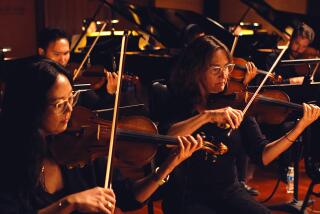S.R. Browne, Pioneer Black Teacher, Dies : Education: He helped integrate the L.A. secondary school system. The accomplished musician also served as a mentor to the prominent jazz figures of the day.
- Share via
Samuel R. Browne, who overcame the prejudice of his contemporaries and the challenges of a traditional music curriculum to become one of the first black teachers in the Los Angeles secondary school system, has died, it was learned Wednesday.
Mentor to such famous jazz figures as Dexter Gordon, O.C. Smith, Chico Hamilton, Buddy Collette and Art Farmer and a musical figure in his own right for many years, Browne was 85 when he died Friday of the complications of age at his Los Angeles home.
Browne was an accomplished pianist, organist and choir director who was raised by a grandmother who made music lessons as important a part of his life as church.
He was educated in the same South-Central area of Los Angeles where he would one day teach and where he sometimes heard white teachers use racial slurs when talking about their black students.
“I never forgot,” he told The Times in a 1979 interview he gave in connection with a dinner held in his honor. “You carry that kind of a scar with you for life.”
He shined shoes and played the organ at various churches to pay his way through USC where he earned bachelor’s and master’s degrees in music and education.
But when it came time to use his newly earned teaching certificate, the only job offers for a young black man came from black Southern schools.
Instead of teaching, Browne traveled with the Cotton Blossom Singers, as pianist and arranger for the quartet.
By 1936 the color barrier had lowered to a point where Browne and one or two other black teachers were being hired in the secondary schools. Over the stated objections of many of his white colleagues, Samuel Rodney Browne integrated the all-white faculty at his alma mater, Jefferson High School.
He remembers being called into the office of an assistant district superintendent who cautioned him: “Remember, Brownie, now that you’ve got the job, you’re going to have to do the work of three white men.”
That was also about the same time that whites and blacks were integrating the so-called after-hours nightclubs on Central Avenue. Ethel Waters and Billie Holiday and Nat (King) Cole and Duke Ellington performed there and Browne in coming years was to invite them to talk to his music students.
But that was after Browne, a widower, had found that the music of his people was not being taught.
He prevailed upon the Board of Education to establish a class he called “Jazz Band” and through it soon passed students who a decade later would help give birth to the modern or “cool” school of jazz.
He remained at Jefferson until 1961 when he transferred to the new Palisades High School. He said later that the hostility in the area that was to erupt a few years later as the Watts riots and the increasing use of drugs prompted that decision.
Browne, who is survived by a daughter, Lisa, retired in 1973, telling his last groups of students who were both affluent and white that he was sorry they had not been around during his early days. For, despite the racial scarring, they were the blowzy, brassy formative days of jazz he remembered collectively as “those wonderful years.”
A funeral service is scheduled at 10 a.m. Thursday at Angelus Funeral Home. Burial will follow in Rose Hills Memorial Park.
More to Read
Sign up for Essential California
The most important California stories and recommendations in your inbox every morning.
You may occasionally receive promotional content from the Los Angeles Times.













